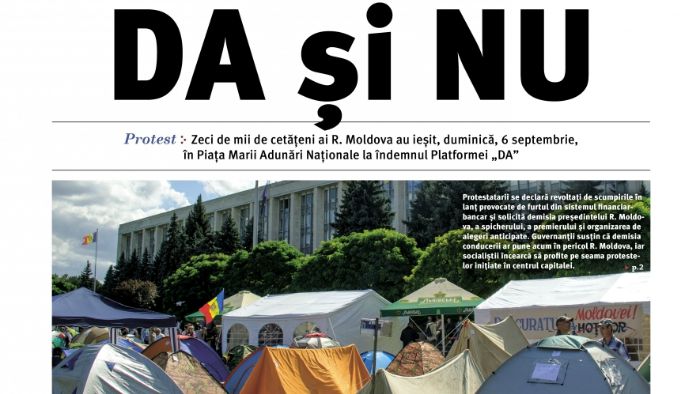Moldovans have massively gone to the streets lately in a fresh wave of demonstrations against the government. Why ?
Radu Magdin: It was exceptional the first time, now it tends to become a periodic event, every few months. Clearly, it is an expression of discontent from the population regards some of the key things that are happening in the country, as well as some upsetting lack of action from the government and the judiciary: it‘s particularly the case of the famous billion dollars that were stolen from the country‘s three main banks. It's normal for that to cause an outcry, ever more since Moldova is a poor country and a billion dollars is an important part of the GDP. The robbery, via a foreign banking scheme, affected the country‘s economic credibility and the purchasing power of its citizens; from this point on up to general discontent with the political class and the justice system, there is only a small step.
Of course, there is also discontent with the government, but my feeling is that we are dealing more with a generalized loss of hope doubled by a loss patience: some Moldovans clearly do not see another way out than street protests, they sense they have no bright prospects. This crisis point can be turned into an opportunity by showing responsibility as a political class, by delivering results; at the same time, the justice system must insure accountability for the persons who are responsible for the bank scandal, no matter their political connections and friendships. Only such action has the potential to provide a high level signal that things are truly moving in the right direction. This is the only way to regain people‘s trust and patience for future reforms.
From the Vilnius summit onwards, Moldova seems to regress and being stuck on its path towards EU membership, and to be condemned to political instability. Who profits from this situation?
This is an issue caused by disagreements among the pro-EU parties‘. What some of them may not understand is that European integration efforts and popularity depend a great deal on the way they handle the country; so, their responsibility is key to the success of Moldova‘s path towards the EU. The leaders of the main pro-European parties (the Liberal-democrats, the Democrats and the Liberals) seem to understand, after a few months, that they need to work together: otherwise, the Liberal party would not have joined the governmental alliance. An exercise of honesty is to be expected this autumn if this alliance wants to have a future: there needs to be transparency regarding what happened with the bank scandal. Then some measures to strenghten the independence of the judiciary system are key, to hold the guilty accountable and get back as much of the money as possible.
If the government does not take steps in these directions, both the citizens and the ruling coalition will be losers, and only Moldova's geopolitical foes would win. If no sufficient action is taken to regain people‘s trust, the executive will either become a lame duck government for the rest of its mandate, or it will have a shorter mandate than expected. Moldova, and Moldovans, deserve better: the current government can still deliver, particularly since it has the majority in the Parliament and elections only happened last November. It‘s basically a matter of political courage, to admit that some things cannot work as before, change is in the air, and it‘s in the interest of the current coalition to renew trust by bringing fresh proposals to the table, in terms of policies, laws, improving the justice system. Such action also would restore international credibility with the EU institutions and the IMF.
Can the current crisis lead to the government's resignation? Will it bring the investigation on the missing billion dollars to a trial?
It's hard to make a prediction. I would say yes as for an acceleration in the inquiry on the missing billion, that is the least that can be done. Regarding the government's fate, the current administration it‘s still a relatively new one, although political fatigue is in the air. I think it‘s in the coalition partners‘ interest to work together to show some key results in the months to come. If they work together and leave aside animosities while focusing on good public policies, they have a chance to renew trust. The future of the administration depends also on what the leaders of the new street movement — "Dignity and Truth" — will do next. If they prefer to form a political party, part of their street "magic" will be lost since political affiliation brings some disenchantment, while society will have more to gain: it's important to be constructive in public proposals, not just to contest the current political system.
Photo: Firts page of Ziarul Naţional, friday, 11 September, "Yes and no".
Was this article useful? If so we are delighted!
It is freely available because we believe that the right to free and independent information is essential for democracy. But this right is not guaranteed forever, and independence comes at a cost. We need your support in order to continue publishing independent, multilingual news for all Europeans.
Discover our subscription offers and their exclusive benefits and become a member of our community now!












